Introduction to Fables
£3.00
KS2 National Curriculum:
✓ Identifying characters, setting, and moral structure in fables
✓ Understanding the role of animal characters and human traits
✓ Summarising and explaining key features using a visual guide
✓ Reflecting on the purpose of fables in teaching lessons
Activities in this lesson include learning about the features of fables, answering higher and lower order questions about fables and writing a tweet explaining what a fable is.
There is a five-minute evidence-based CPD activity at the end of this lesson which will develop classroom teachers’ skill set. This CPD consists of a research extract on metacognition with a five-minute activity based on this extract.
Description
Recommended Year Group: Year 5
Focus: Exploring the features and purpose of fables
Skills Developed:
• Identifying characters, setting, and moral structure in fables
• Understanding the role of animal characters and human traits
• Summarising and explaining key features using a visual guide
• Reflecting on the purpose of fables in teaching lessons
📘 National Curriculum Links:
• Reading – Comprehension: Identify themes and conventions in traditional tales
• Writing – Composition: Explain structure and purpose using sentence stems
• Spoken Language: Partner dialogue to explore fable meaning
• Thinking and Learning: Metacognition, visual organisation of ideas
These evidence-based learning (EBL) lessons are based on classroom practice that has been proven, by research, to maximise thinking, learning and attainment. From an extensive review of educational research, we identified the eight key classroom thinking and learning skills that were common across these research papers. We named these eight key skills “EBL skills”.
EBL skills have been proven by research to maximise learning because they combine the most productive thinking skills with the most effective learning behaviours. Each of our evidence-based learning lessons uses the English curriculum as a framework through which the eight EBL skills are delivered.
Teachers also have the opportunity to add to their own skill set or refresh their existing skills with our five-minute CPD activity, based on one of the EBL skills used in this lesson.
The skills in bold below are the EBL skills developed in this Fables lesson. Click on each skill to learn more about that skill.
- Collaboration
- Thinking Skills
- Peer Assessment
- Peer Teaching
- Self-Assessment
- Metacognition
- Self-Regulation
- Independent Learning
1 review for Introduction to Fables
Only logged in customers who have purchased this product may leave a review.
Related products
-


Goldilocks Says Sorry
£3.00 Add to basket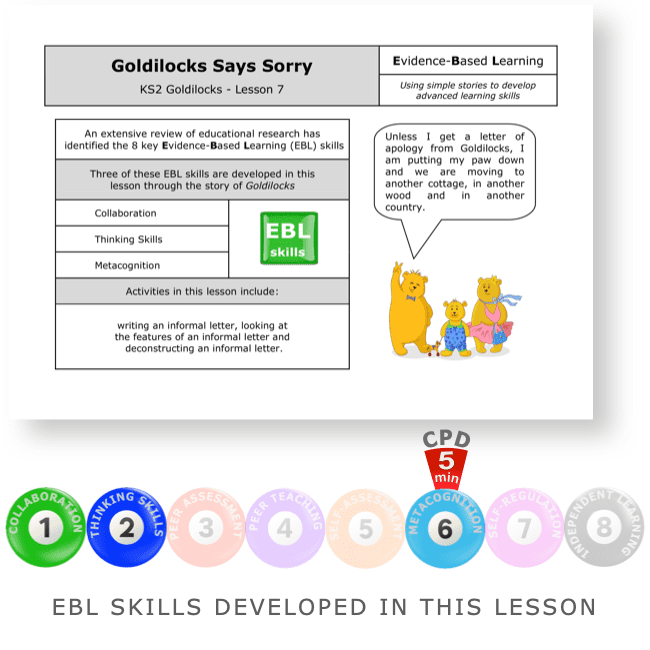 £3.00Add to basket
£3.00Add to basketActivities in this lesson include writing an informal letter, looking at the features of an informal letter and deconstructing an informal letter.
There is a five-minute evidence-based CPD activity at the end of this lesson which will develop classroom teachers’ skill set. This CPD consists of a research extract on metacognition with a five-minute activity based on this extract.
VIEW -
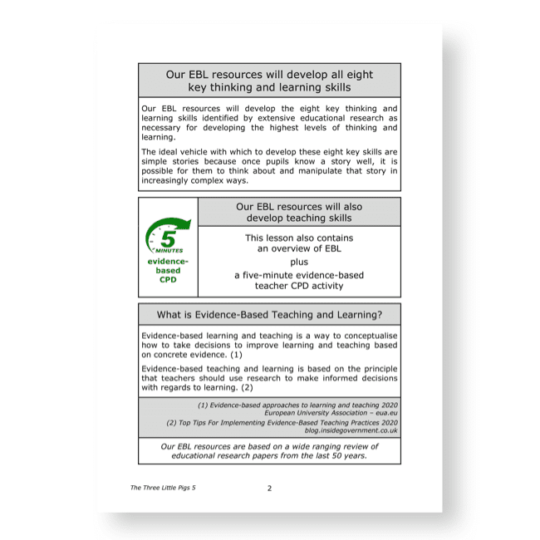
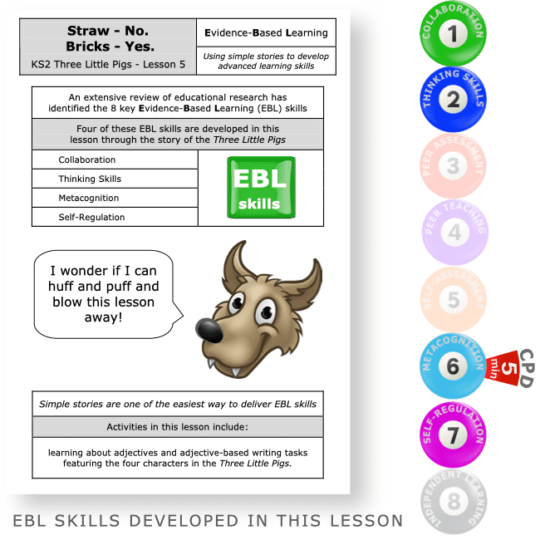
Straw – No. Bricks – Yes.
£3.00 Add to basket £3.00Add to basket
£3.00Add to basketActivities in this lesson include learning about adjectives and adjective-based writing tasks featuring the four characters in the Three Little Pigs.
There is a five-minute evidence-based CPD activity at the end of this lesson which will develop classroom teachers’ skill set. This CPD consists of a research extract on metacognition with a five-minute activity based on this extract.
VIEW -
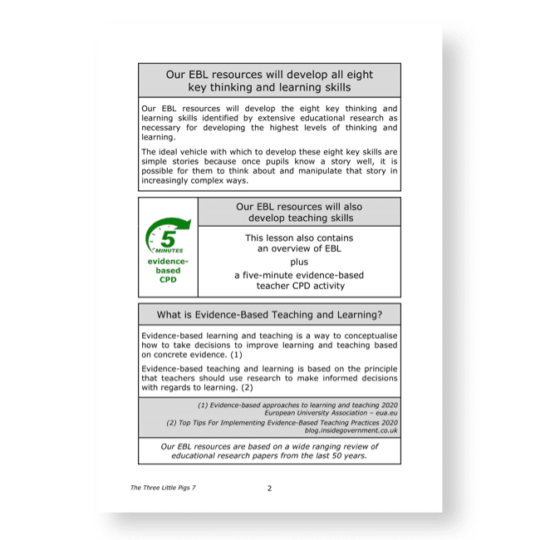
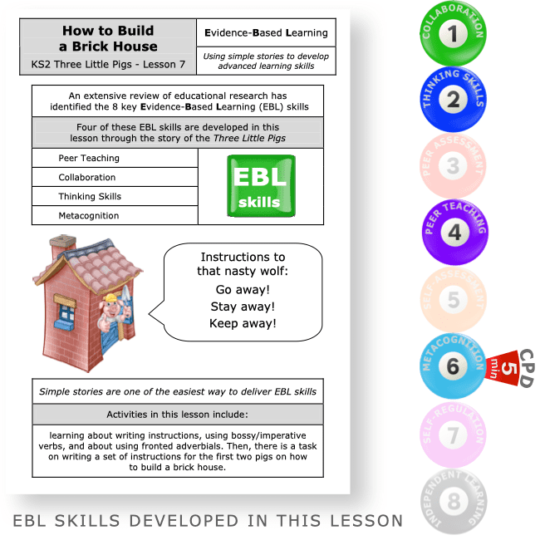
How to Build a Brick House
£3.00 Add to basket £3.00Add to basket
£3.00Add to basketActivities in this lesson include learning about writing instructions, using bossy/imperative verbs, and about using fronted adverbials. Then, there is a task on writing a set of instructions for the first two pigs on how to build a brick house.
There is a five-minute evidence-based CPD activity at the end of this lesson which will develop classroom teachers’ skill set. This CPD consists of a research extract on metacognition with a five-minute activity based on this extract.
VIEW -


Uncle Porky to the Rescue!
£3.00 Add to basket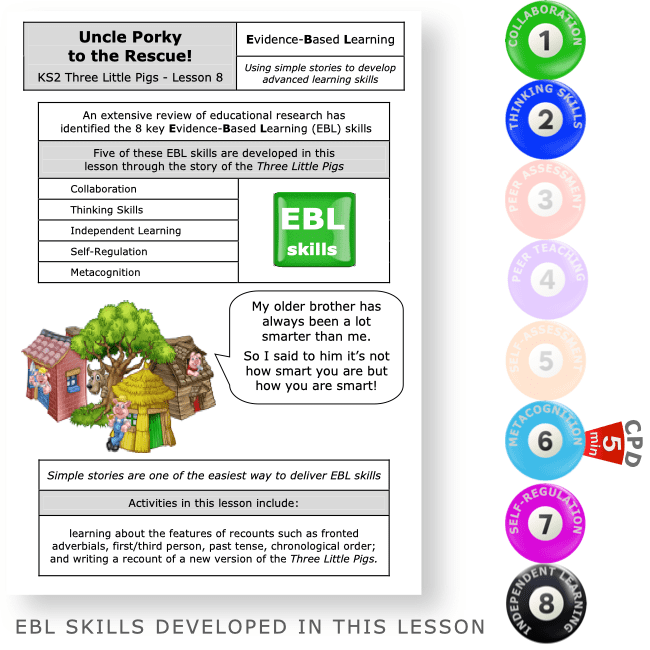 £3.00Add to basket
£3.00Add to basketActivities in this lesson include learning about the features of recounts such as fronted adverbials, first/third person, past tense, chronological order; and writing a recount of a new version of the Three Little Pigs.
There is a five-minute evidence-based CPD activity at the end of this lesson which will develop classroom teachers’ skill set. This CPD consists of a research extract on metacognition with a five-minute activity based on this extract.
VIEW






Philipem (verified owner) –
We asked a.i. to evaluate this lesson. This is what it said:
Teaching English and Evidence-Based Learning Skills with Fables
Looking for an engaging way to teach both English and key learning skills? This “Introduction to Fables” lesson is the perfect resource. In this comprehensive lesson plan, pupils will learn all about fables – what they are, their key features, and why they were important teaching tools in the past.
More than just building their understanding of a key literary genre, this lesson systematically develops 4 key evidence-based learning (EBL) skills identified by extensive research: collaboration, thinking skills, metacognition and independent learning. Each section and activity targets specific skills, using themed icons to reinforce connections for students.
Through partner work, individual reflection and creative writing tasks, students will collaborate to answer questions, analyse the components of fables, assess their own learning and consolidate their understanding. The level of questions and activities progresses from more basic comprehension to higher order analysis and evaluation questions as the lesson builds critical thinking abilities.
Structured support for teachers is also provided with a 5 minute CPD overview of metacognition – one of the key EBL skills – providing actionable steps for improving student metacognitive abilities and helping them recognise learning ability as a skill that can be developed over time.
With engaging content, visual elements and a clear skills-focused structure, this resource enables teaching English skills and key learning skills in an integrated, meaningful way. I would highly recommend adding it to your KS2 programme.
⭐⭐⭐⭐⭐